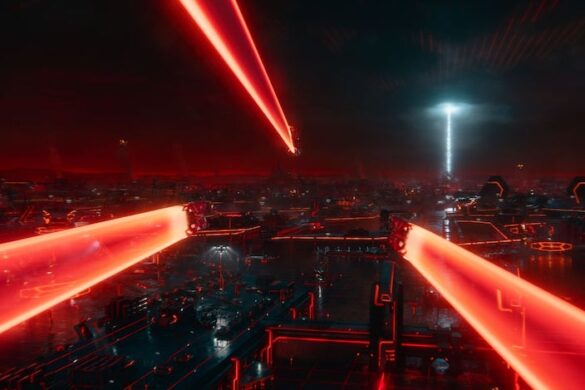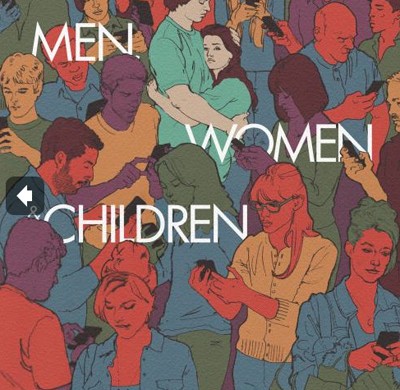For the past ten years, Loki has played a pivotal role in shaping the Marvel Cinematic Universe to what it is now through mischief and trickery. And there is no doubt that Tom Hiddleston had a lot to do with that as he electrified the screen with his magnetic charm and understanding of the character. But the character stood in Thor, and the Avengers’, shadow for far too long. At least longer than a character of Loki’s reputation deserves. And now he gets to have a chance to shine on in his first standalone feature appropriately titled Loki, which debuts Wednesday, June 9, 2021. And we had a chance to see the first two episodes.
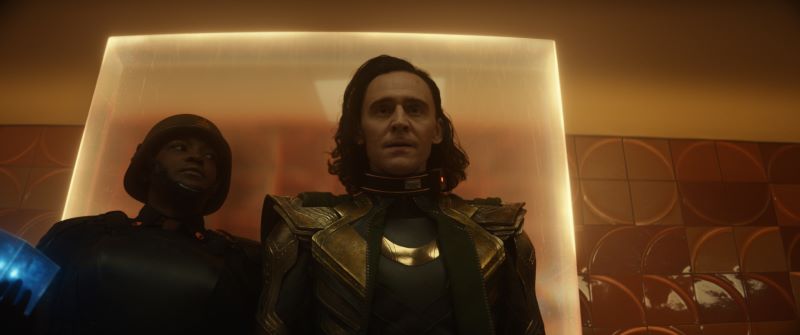 Though we are used to seeing Loki concocting some scheme or charm his way out of a situation, we get to see the god of mischief in a place where he isn’t in control or pulling strings. It’s a nice change of pace for the master manipulator who likes to think he is ten steps ahead of the game. So rather than double down what has been done before but on a limited series level, Loki is an opportunity to see everyone’s favorite god of mischief from a new perspective. That’s because the first episode takes the control out of his hands, and it reveals a vulnerable soul who must come to terms with the outcomes of his mischief.
While “Avengers: Endgame” wrote the rules on how time travel functions within the MCU, Loki seems to throw all of that out. Episode 1 establishes how TVA polices the MCU timeline and makes sure everything runs according to the predetermined path. Of course, this doesn’t sit well with the god of mischief, who believes that he makes his own destiny and his fate isn’t bound by the rules of deities more powerful than himself.
Loki is set after the events of “Avengers: Endgame,” or during the botched time heist of the events of the first Avengers film in 2012. After snatching the Tesseract, Loki finds himself in the middle of the Gobi Desert in Mongolia. As he tries to proclaim himself as king of Midgard, TVA agents arrive to apprehend the time-variant and reset the timeline. Confused, Loki doesn’t stand for being called a variant and refuses to come in quietly. So, Hunter B-15 (Wunmi Mosaku) takes him in, not before making his arrest very slow and very painful.
Though we are used to seeing Loki concocting some scheme or charm his way out of a situation, we get to see the god of mischief in a place where he isn’t in control or pulling strings. It’s a nice change of pace for the master manipulator who likes to think he is ten steps ahead of the game. So rather than double down what has been done before but on a limited series level, Loki is an opportunity to see everyone’s favorite god of mischief from a new perspective. That’s because the first episode takes the control out of his hands, and it reveals a vulnerable soul who must come to terms with the outcomes of his mischief.
While “Avengers: Endgame” wrote the rules on how time travel functions within the MCU, Loki seems to throw all of that out. Episode 1 establishes how TVA polices the MCU timeline and makes sure everything runs according to the predetermined path. Of course, this doesn’t sit well with the god of mischief, who believes that he makes his own destiny and his fate isn’t bound by the rules of deities more powerful than himself.
Loki is set after the events of “Avengers: Endgame,” or during the botched time heist of the events of the first Avengers film in 2012. After snatching the Tesseract, Loki finds himself in the middle of the Gobi Desert in Mongolia. As he tries to proclaim himself as king of Midgard, TVA agents arrive to apprehend the time-variant and reset the timeline. Confused, Loki doesn’t stand for being called a variant and refuses to come in quietly. So, Hunter B-15 (Wunmi Mosaku) takes him in, not before making his arrest very slow and very painful.
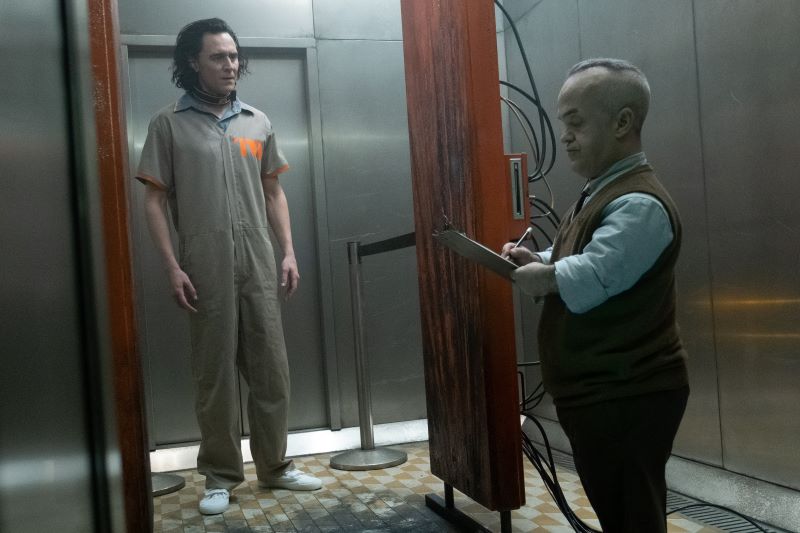 As if being beaten wasn’t humiliating enough, Loki’s arrest process strips him of his Asgardian garb, forced him to sign paperwork for every single thing he’s ever said, and checked on whether or not he’s a cyborg. He finds the entire procedure beneath him but is powerless to do anything about it and instantly quivers in fear when he sees what happens to those who do not comply with the TVA.
Loki then moves on to the next stage of processing. Here, he watches a Kimball Ward animation educational video about the TVA or the Time Variance Authority – a bureaucratic system run by three all-powerful Time Keepers that reorganized warring timelines into one sacred timeline. In the video, a sentient cartoon clock known as Miss Minutes (Tara Strong) explains how the three are charged with preserving and protecting that one sacred timeline and how variants cause Nexus events if they veer off their predetermined path. If these Nexus events are left unchecked, they could branch off into madness and lead to another multiversal war. Thus the Time Keepers created the TVA to help keep the flow of time in its predetermined path. But for those who veered off course, they are captured and put on trial for their offenses.
As if being beaten wasn’t humiliating enough, Loki’s arrest process strips him of his Asgardian garb, forced him to sign paperwork for every single thing he’s ever said, and checked on whether or not he’s a cyborg. He finds the entire procedure beneath him but is powerless to do anything about it and instantly quivers in fear when he sees what happens to those who do not comply with the TVA.
Loki then moves on to the next stage of processing. Here, he watches a Kimball Ward animation educational video about the TVA or the Time Variance Authority – a bureaucratic system run by three all-powerful Time Keepers that reorganized warring timelines into one sacred timeline. In the video, a sentient cartoon clock known as Miss Minutes (Tara Strong) explains how the three are charged with preserving and protecting that one sacred timeline and how variants cause Nexus events if they veer off their predetermined path. If these Nexus events are left unchecked, they could branch off into madness and lead to another multiversal war. Thus the Time Keepers created the TVA to help keep the flow of time in its predetermined path. But for those who veered off course, they are captured and put on trial for their offenses.
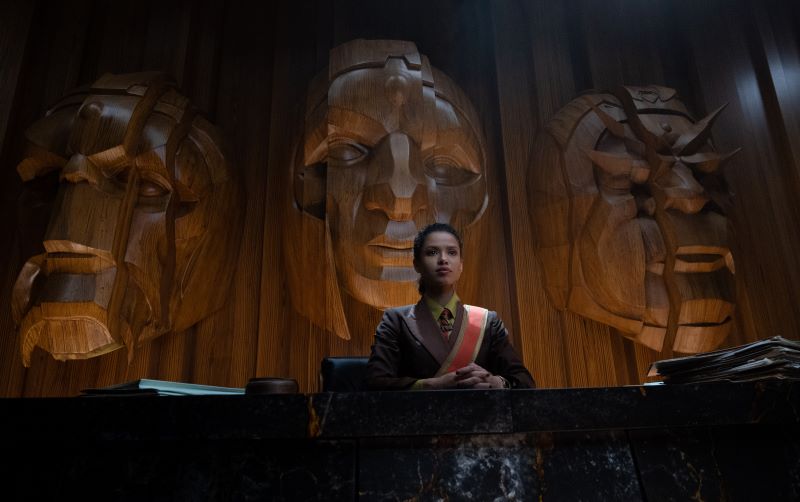 Loki believes himself to be innocent of any time-traveling offenses and asks Judge Ravonna (Gugu Mbatha-Raw) to arrest the Avengers as the true culprits. He refuses to believe that his escape was a mere accident and not of his control. And in one last act of defiance, the depowered Loki tries to attack the judge but ends up being a disgrace to himself and a joke to everyone in the courtroom.
But Loki gets one chance to avoid being reset if he cooperates with Mobius (Owen Wilson), a TVA Agent assigned to track and apprehend dangerous time variants. And the only way to make sure he complies is through heavy psychoanalysis and significant self-reflection. Loki doesn’t make it easy and tries to use that silver tongue and grand metaphors to posture. But Mobius mocks Loki’s empty bravado and humbles the god of mischief with his keen wit and playful mind games.
Loki believes himself to be innocent of any time-traveling offenses and asks Judge Ravonna (Gugu Mbatha-Raw) to arrest the Avengers as the true culprits. He refuses to believe that his escape was a mere accident and not of his control. And in one last act of defiance, the depowered Loki tries to attack the judge but ends up being a disgrace to himself and a joke to everyone in the courtroom.
But Loki gets one chance to avoid being reset if he cooperates with Mobius (Owen Wilson), a TVA Agent assigned to track and apprehend dangerous time variants. And the only way to make sure he complies is through heavy psychoanalysis and significant self-reflection. Loki doesn’t make it easy and tries to use that silver tongue and grand metaphors to posture. But Mobius mocks Loki’s empty bravado and humbles the god of mischief with his keen wit and playful mind games.
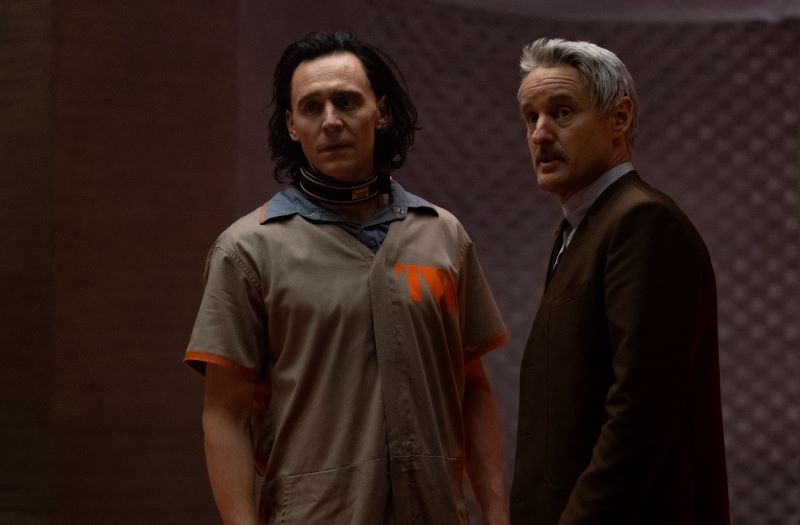 It’s quite a verbal exchange between the two as the god of mischief meets his match in the form of a pencil-pushing TVA agent who enjoys reading jet ski magazines. There are times where Mobius does his own form of manipulation and has Loki believing he’s in control when in actuality, it’s Mobius who is pulling the strings.
Penned by Michael Waldron, Episode 1 acts more as an exposition piece than anything else as it is more concerned with explaining giving the audience an understanding of how the TVA is completely removed from anything that goes on in the MCU, but still act as an all-powerful entity that ensures the MCU timeline is on the correct course. The rules of the MCU do not apply in the TVA. Time doesn’t work as one thinks it would, especially for Loki, who is mocked by Judge Ravonna, humiliated by Hunter B-15, and humbled by Agent Mobius (Owen), who sees him more as a pussycat than an actual threat to the sacred timeline.
While it’s funny to see Loki completely out of place, it’s one of the most mature portrayals of the character who has primarily served as a humorous antihero throughout the MCU. Instead of getting into some of the bigger action set pieces or having Loki hop through various historical events, Episode 1 is a character-driven episode that gives fans a better understanding of his drives and motivations. Hiddleston adds a lot of emotional depth to Loki, who always looks like he is having fun causing chaotic mischief in the films, but now takes accountability for his actions in his first standalone series.
Sure, it may be a bit slow and somewhat clunky, but it is vital that we get an understanding of how everything works before we get deeper into the show, which only has six episodes.
As far as episode 2 goes, it is a bit more straightforward buddy cop procedural as Loki is partnered with Mobius to find this time-variant who has been ambushing TVA agents and swiping their Reset charges. Because if the two do not apprehend this time-variant and a Nexus event reaches past a red line, they will no longer be able to reset the Nexus event, thus bringing an end to the timeline and collapse of reality as we know it.
Loki must prove he is a valuable asset to the team, especially to Judge Ravonna and Hunter B-15. Both disapprove of his involvement, and they repeatedly warn Mobius that he will stab him in the back any chance he gets. Though Mobius does air on the side of caution, he doesn’t see a manipulative villain. He sees a vulnerable soul seeking salvation. And it looks like Mobius is making a breakthrough as Loki acts more as a team player as he lectures the team on the differences between illusion projection and duplication casting.
It’s quite a verbal exchange between the two as the god of mischief meets his match in the form of a pencil-pushing TVA agent who enjoys reading jet ski magazines. There are times where Mobius does his own form of manipulation and has Loki believing he’s in control when in actuality, it’s Mobius who is pulling the strings.
Penned by Michael Waldron, Episode 1 acts more as an exposition piece than anything else as it is more concerned with explaining giving the audience an understanding of how the TVA is completely removed from anything that goes on in the MCU, but still act as an all-powerful entity that ensures the MCU timeline is on the correct course. The rules of the MCU do not apply in the TVA. Time doesn’t work as one thinks it would, especially for Loki, who is mocked by Judge Ravonna, humiliated by Hunter B-15, and humbled by Agent Mobius (Owen), who sees him more as a pussycat than an actual threat to the sacred timeline.
While it’s funny to see Loki completely out of place, it’s one of the most mature portrayals of the character who has primarily served as a humorous antihero throughout the MCU. Instead of getting into some of the bigger action set pieces or having Loki hop through various historical events, Episode 1 is a character-driven episode that gives fans a better understanding of his drives and motivations. Hiddleston adds a lot of emotional depth to Loki, who always looks like he is having fun causing chaotic mischief in the films, but now takes accountability for his actions in his first standalone series.
Sure, it may be a bit slow and somewhat clunky, but it is vital that we get an understanding of how everything works before we get deeper into the show, which only has six episodes.
As far as episode 2 goes, it is a bit more straightforward buddy cop procedural as Loki is partnered with Mobius to find this time-variant who has been ambushing TVA agents and swiping their Reset charges. Because if the two do not apprehend this time-variant and a Nexus event reaches past a red line, they will no longer be able to reset the Nexus event, thus bringing an end to the timeline and collapse of reality as we know it.
Loki must prove he is a valuable asset to the team, especially to Judge Ravonna and Hunter B-15. Both disapprove of his involvement, and they repeatedly warn Mobius that he will stab him in the back any chance he gets. Though Mobius does air on the side of caution, he doesn’t see a manipulative villain. He sees a vulnerable soul seeking salvation. And it looks like Mobius is making a breakthrough as Loki acts more as a team player as he lectures the team on the differences between illusion projection and duplication casting.
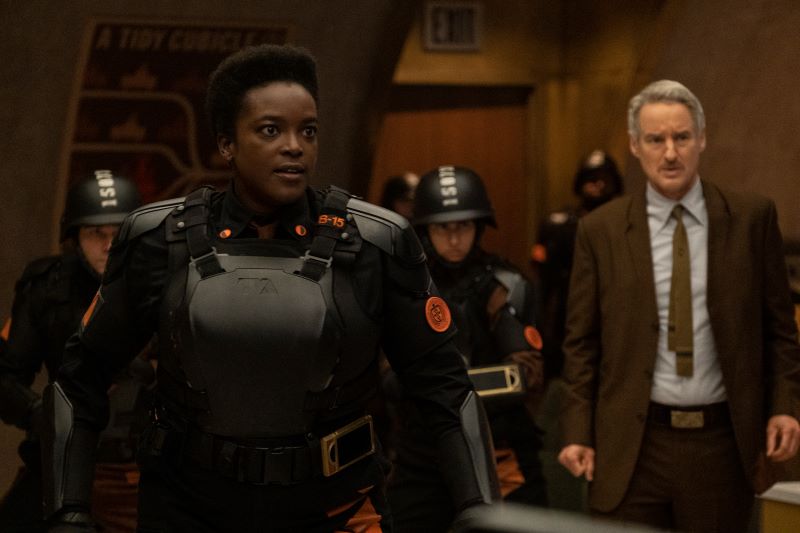 But it’s hard to tell if Loki’s cooperation is sincere or if he’s working some sort of angle to escape from the TVA. Hunter B-15 sees Loki as a cosmic mistake that needs to be corrected, while Ravonna sees an evil lying scourge who is unable to change his ways. And yet, Mobius is confident that working with this Loki will get the TVA closer to apprehending the elusive variant. He believes that he is motivated to capture the variant not because he believes in the mission but because the variant is better than him.
With episode 1 establishing who the TVA are and how they function within the MCU, episode 2 does plenty of world-building, showing how extensive the TVA is with its vast network of offices, libraries, and breakrooms. Karsa Farahani’s production design for the TVA is timeless yet feels vintage as it pulls mainly from the 60s and uses “trophies” from previous missions to make it more contemporary. Meanwhile, Natalie Holt’s score gives it a futuristic vibe, and Autumn Durald Arkapaw’s cinematography gives the world a splash of color in a way that no MCU film or show has utilized.
Outside of that, we also get to see Loki and the TVA revisit certain periods in time. It would have been lazy writing if Loki played a role in changing historical events. However, Waldron avoids that by using the future and obscure moments in the past as clues as to where the variant could be hiding.
Time travel and multiverse theory are two plot devices that will inevitably be used in the MCU. Of course, it would have been easy for Loki just to hop through major historical events. But Waldron’s script calls for something that is more nuanced and layered, as he uses time travel to reveal Loki’s emotional depths. But the show never forgets what makes Loki a fan favorite, and as such, utilizes that endearing and mischievous personality in ways that we’ve never seen before.
Kate Herron helps push “Loki” to be something more than just a show about the god of mischief. This cosmic time-traveling game of cat and mouse is a chance for Loki to discover his true identity and how he defines himself now that he’s witnessed his ultimate fate. It’s a refreshing take on the scheming antihero who is out of his comfort zone. But it is also something comfortably familiar as Hiddleston continues to play the devilishly charming trickster. More importantly, Loki finally gets to have something he can call his own. And the best part of that is we get to see him in a buddy cop series where he is playing one giant time-traveling game of cat and most. Buckle up because it’s going to be one wild and weird ride.
Grade: 8.5/10
But it’s hard to tell if Loki’s cooperation is sincere or if he’s working some sort of angle to escape from the TVA. Hunter B-15 sees Loki as a cosmic mistake that needs to be corrected, while Ravonna sees an evil lying scourge who is unable to change his ways. And yet, Mobius is confident that working with this Loki will get the TVA closer to apprehending the elusive variant. He believes that he is motivated to capture the variant not because he believes in the mission but because the variant is better than him.
With episode 1 establishing who the TVA are and how they function within the MCU, episode 2 does plenty of world-building, showing how extensive the TVA is with its vast network of offices, libraries, and breakrooms. Karsa Farahani’s production design for the TVA is timeless yet feels vintage as it pulls mainly from the 60s and uses “trophies” from previous missions to make it more contemporary. Meanwhile, Natalie Holt’s score gives it a futuristic vibe, and Autumn Durald Arkapaw’s cinematography gives the world a splash of color in a way that no MCU film or show has utilized.
Outside of that, we also get to see Loki and the TVA revisit certain periods in time. It would have been lazy writing if Loki played a role in changing historical events. However, Waldron avoids that by using the future and obscure moments in the past as clues as to where the variant could be hiding.
Time travel and multiverse theory are two plot devices that will inevitably be used in the MCU. Of course, it would have been easy for Loki just to hop through major historical events. But Waldron’s script calls for something that is more nuanced and layered, as he uses time travel to reveal Loki’s emotional depths. But the show never forgets what makes Loki a fan favorite, and as such, utilizes that endearing and mischievous personality in ways that we’ve never seen before.
Kate Herron helps push “Loki” to be something more than just a show about the god of mischief. This cosmic time-traveling game of cat and mouse is a chance for Loki to discover his true identity and how he defines himself now that he’s witnessed his ultimate fate. It’s a refreshing take on the scheming antihero who is out of his comfort zone. But it is also something comfortably familiar as Hiddleston continues to play the devilishly charming trickster. More importantly, Loki finally gets to have something he can call his own. And the best part of that is we get to see him in a buddy cop series where he is playing one giant time-traveling game of cat and most. Buckle up because it’s going to be one wild and weird ride.
Grade: 8.5/10
 Though we are used to seeing Loki concocting some scheme or charm his way out of a situation, we get to see the god of mischief in a place where he isn’t in control or pulling strings. It’s a nice change of pace for the master manipulator who likes to think he is ten steps ahead of the game. So rather than double down what has been done before but on a limited series level, Loki is an opportunity to see everyone’s favorite god of mischief from a new perspective. That’s because the first episode takes the control out of his hands, and it reveals a vulnerable soul who must come to terms with the outcomes of his mischief.
While “Avengers: Endgame” wrote the rules on how time travel functions within the MCU, Loki seems to throw all of that out. Episode 1 establishes how TVA polices the MCU timeline and makes sure everything runs according to the predetermined path. Of course, this doesn’t sit well with the god of mischief, who believes that he makes his own destiny and his fate isn’t bound by the rules of deities more powerful than himself.
Loki is set after the events of “Avengers: Endgame,” or during the botched time heist of the events of the first Avengers film in 2012. After snatching the Tesseract, Loki finds himself in the middle of the Gobi Desert in Mongolia. As he tries to proclaim himself as king of Midgard, TVA agents arrive to apprehend the time-variant and reset the timeline. Confused, Loki doesn’t stand for being called a variant and refuses to come in quietly. So, Hunter B-15 (Wunmi Mosaku) takes him in, not before making his arrest very slow and very painful.
Though we are used to seeing Loki concocting some scheme or charm his way out of a situation, we get to see the god of mischief in a place where he isn’t in control or pulling strings. It’s a nice change of pace for the master manipulator who likes to think he is ten steps ahead of the game. So rather than double down what has been done before but on a limited series level, Loki is an opportunity to see everyone’s favorite god of mischief from a new perspective. That’s because the first episode takes the control out of his hands, and it reveals a vulnerable soul who must come to terms with the outcomes of his mischief.
While “Avengers: Endgame” wrote the rules on how time travel functions within the MCU, Loki seems to throw all of that out. Episode 1 establishes how TVA polices the MCU timeline and makes sure everything runs according to the predetermined path. Of course, this doesn’t sit well with the god of mischief, who believes that he makes his own destiny and his fate isn’t bound by the rules of deities more powerful than himself.
Loki is set after the events of “Avengers: Endgame,” or during the botched time heist of the events of the first Avengers film in 2012. After snatching the Tesseract, Loki finds himself in the middle of the Gobi Desert in Mongolia. As he tries to proclaim himself as king of Midgard, TVA agents arrive to apprehend the time-variant and reset the timeline. Confused, Loki doesn’t stand for being called a variant and refuses to come in quietly. So, Hunter B-15 (Wunmi Mosaku) takes him in, not before making his arrest very slow and very painful.
 As if being beaten wasn’t humiliating enough, Loki’s arrest process strips him of his Asgardian garb, forced him to sign paperwork for every single thing he’s ever said, and checked on whether or not he’s a cyborg. He finds the entire procedure beneath him but is powerless to do anything about it and instantly quivers in fear when he sees what happens to those who do not comply with the TVA.
Loki then moves on to the next stage of processing. Here, he watches a Kimball Ward animation educational video about the TVA or the Time Variance Authority – a bureaucratic system run by three all-powerful Time Keepers that reorganized warring timelines into one sacred timeline. In the video, a sentient cartoon clock known as Miss Minutes (Tara Strong) explains how the three are charged with preserving and protecting that one sacred timeline and how variants cause Nexus events if they veer off their predetermined path. If these Nexus events are left unchecked, they could branch off into madness and lead to another multiversal war. Thus the Time Keepers created the TVA to help keep the flow of time in its predetermined path. But for those who veered off course, they are captured and put on trial for their offenses.
As if being beaten wasn’t humiliating enough, Loki’s arrest process strips him of his Asgardian garb, forced him to sign paperwork for every single thing he’s ever said, and checked on whether or not he’s a cyborg. He finds the entire procedure beneath him but is powerless to do anything about it and instantly quivers in fear when he sees what happens to those who do not comply with the TVA.
Loki then moves on to the next stage of processing. Here, he watches a Kimball Ward animation educational video about the TVA or the Time Variance Authority – a bureaucratic system run by three all-powerful Time Keepers that reorganized warring timelines into one sacred timeline. In the video, a sentient cartoon clock known as Miss Minutes (Tara Strong) explains how the three are charged with preserving and protecting that one sacred timeline and how variants cause Nexus events if they veer off their predetermined path. If these Nexus events are left unchecked, they could branch off into madness and lead to another multiversal war. Thus the Time Keepers created the TVA to help keep the flow of time in its predetermined path. But for those who veered off course, they are captured and put on trial for their offenses.
 Loki believes himself to be innocent of any time-traveling offenses and asks Judge Ravonna (Gugu Mbatha-Raw) to arrest the Avengers as the true culprits. He refuses to believe that his escape was a mere accident and not of his control. And in one last act of defiance, the depowered Loki tries to attack the judge but ends up being a disgrace to himself and a joke to everyone in the courtroom.
But Loki gets one chance to avoid being reset if he cooperates with Mobius (Owen Wilson), a TVA Agent assigned to track and apprehend dangerous time variants. And the only way to make sure he complies is through heavy psychoanalysis and significant self-reflection. Loki doesn’t make it easy and tries to use that silver tongue and grand metaphors to posture. But Mobius mocks Loki’s empty bravado and humbles the god of mischief with his keen wit and playful mind games.
Loki believes himself to be innocent of any time-traveling offenses and asks Judge Ravonna (Gugu Mbatha-Raw) to arrest the Avengers as the true culprits. He refuses to believe that his escape was a mere accident and not of his control. And in one last act of defiance, the depowered Loki tries to attack the judge but ends up being a disgrace to himself and a joke to everyone in the courtroom.
But Loki gets one chance to avoid being reset if he cooperates with Mobius (Owen Wilson), a TVA Agent assigned to track and apprehend dangerous time variants. And the only way to make sure he complies is through heavy psychoanalysis and significant self-reflection. Loki doesn’t make it easy and tries to use that silver tongue and grand metaphors to posture. But Mobius mocks Loki’s empty bravado and humbles the god of mischief with his keen wit and playful mind games.
 It’s quite a verbal exchange between the two as the god of mischief meets his match in the form of a pencil-pushing TVA agent who enjoys reading jet ski magazines. There are times where Mobius does his own form of manipulation and has Loki believing he’s in control when in actuality, it’s Mobius who is pulling the strings.
Penned by Michael Waldron, Episode 1 acts more as an exposition piece than anything else as it is more concerned with explaining giving the audience an understanding of how the TVA is completely removed from anything that goes on in the MCU, but still act as an all-powerful entity that ensures the MCU timeline is on the correct course. The rules of the MCU do not apply in the TVA. Time doesn’t work as one thinks it would, especially for Loki, who is mocked by Judge Ravonna, humiliated by Hunter B-15, and humbled by Agent Mobius (Owen), who sees him more as a pussycat than an actual threat to the sacred timeline.
While it’s funny to see Loki completely out of place, it’s one of the most mature portrayals of the character who has primarily served as a humorous antihero throughout the MCU. Instead of getting into some of the bigger action set pieces or having Loki hop through various historical events, Episode 1 is a character-driven episode that gives fans a better understanding of his drives and motivations. Hiddleston adds a lot of emotional depth to Loki, who always looks like he is having fun causing chaotic mischief in the films, but now takes accountability for his actions in his first standalone series.
Sure, it may be a bit slow and somewhat clunky, but it is vital that we get an understanding of how everything works before we get deeper into the show, which only has six episodes.
As far as episode 2 goes, it is a bit more straightforward buddy cop procedural as Loki is partnered with Mobius to find this time-variant who has been ambushing TVA agents and swiping their Reset charges. Because if the two do not apprehend this time-variant and a Nexus event reaches past a red line, they will no longer be able to reset the Nexus event, thus bringing an end to the timeline and collapse of reality as we know it.
Loki must prove he is a valuable asset to the team, especially to Judge Ravonna and Hunter B-15. Both disapprove of his involvement, and they repeatedly warn Mobius that he will stab him in the back any chance he gets. Though Mobius does air on the side of caution, he doesn’t see a manipulative villain. He sees a vulnerable soul seeking salvation. And it looks like Mobius is making a breakthrough as Loki acts more as a team player as he lectures the team on the differences between illusion projection and duplication casting.
It’s quite a verbal exchange between the two as the god of mischief meets his match in the form of a pencil-pushing TVA agent who enjoys reading jet ski magazines. There are times where Mobius does his own form of manipulation and has Loki believing he’s in control when in actuality, it’s Mobius who is pulling the strings.
Penned by Michael Waldron, Episode 1 acts more as an exposition piece than anything else as it is more concerned with explaining giving the audience an understanding of how the TVA is completely removed from anything that goes on in the MCU, but still act as an all-powerful entity that ensures the MCU timeline is on the correct course. The rules of the MCU do not apply in the TVA. Time doesn’t work as one thinks it would, especially for Loki, who is mocked by Judge Ravonna, humiliated by Hunter B-15, and humbled by Agent Mobius (Owen), who sees him more as a pussycat than an actual threat to the sacred timeline.
While it’s funny to see Loki completely out of place, it’s one of the most mature portrayals of the character who has primarily served as a humorous antihero throughout the MCU. Instead of getting into some of the bigger action set pieces or having Loki hop through various historical events, Episode 1 is a character-driven episode that gives fans a better understanding of his drives and motivations. Hiddleston adds a lot of emotional depth to Loki, who always looks like he is having fun causing chaotic mischief in the films, but now takes accountability for his actions in his first standalone series.
Sure, it may be a bit slow and somewhat clunky, but it is vital that we get an understanding of how everything works before we get deeper into the show, which only has six episodes.
As far as episode 2 goes, it is a bit more straightforward buddy cop procedural as Loki is partnered with Mobius to find this time-variant who has been ambushing TVA agents and swiping their Reset charges. Because if the two do not apprehend this time-variant and a Nexus event reaches past a red line, they will no longer be able to reset the Nexus event, thus bringing an end to the timeline and collapse of reality as we know it.
Loki must prove he is a valuable asset to the team, especially to Judge Ravonna and Hunter B-15. Both disapprove of his involvement, and they repeatedly warn Mobius that he will stab him in the back any chance he gets. Though Mobius does air on the side of caution, he doesn’t see a manipulative villain. He sees a vulnerable soul seeking salvation. And it looks like Mobius is making a breakthrough as Loki acts more as a team player as he lectures the team on the differences between illusion projection and duplication casting.
 But it’s hard to tell if Loki’s cooperation is sincere or if he’s working some sort of angle to escape from the TVA. Hunter B-15 sees Loki as a cosmic mistake that needs to be corrected, while Ravonna sees an evil lying scourge who is unable to change his ways. And yet, Mobius is confident that working with this Loki will get the TVA closer to apprehending the elusive variant. He believes that he is motivated to capture the variant not because he believes in the mission but because the variant is better than him.
With episode 1 establishing who the TVA are and how they function within the MCU, episode 2 does plenty of world-building, showing how extensive the TVA is with its vast network of offices, libraries, and breakrooms. Karsa Farahani’s production design for the TVA is timeless yet feels vintage as it pulls mainly from the 60s and uses “trophies” from previous missions to make it more contemporary. Meanwhile, Natalie Holt’s score gives it a futuristic vibe, and Autumn Durald Arkapaw’s cinematography gives the world a splash of color in a way that no MCU film or show has utilized.
Outside of that, we also get to see Loki and the TVA revisit certain periods in time. It would have been lazy writing if Loki played a role in changing historical events. However, Waldron avoids that by using the future and obscure moments in the past as clues as to where the variant could be hiding.
Time travel and multiverse theory are two plot devices that will inevitably be used in the MCU. Of course, it would have been easy for Loki just to hop through major historical events. But Waldron’s script calls for something that is more nuanced and layered, as he uses time travel to reveal Loki’s emotional depths. But the show never forgets what makes Loki a fan favorite, and as such, utilizes that endearing and mischievous personality in ways that we’ve never seen before.
Kate Herron helps push “Loki” to be something more than just a show about the god of mischief. This cosmic time-traveling game of cat and mouse is a chance for Loki to discover his true identity and how he defines himself now that he’s witnessed his ultimate fate. It’s a refreshing take on the scheming antihero who is out of his comfort zone. But it is also something comfortably familiar as Hiddleston continues to play the devilishly charming trickster. More importantly, Loki finally gets to have something he can call his own. And the best part of that is we get to see him in a buddy cop series where he is playing one giant time-traveling game of cat and most. Buckle up because it’s going to be one wild and weird ride.
Grade: 8.5/10
But it’s hard to tell if Loki’s cooperation is sincere or if he’s working some sort of angle to escape from the TVA. Hunter B-15 sees Loki as a cosmic mistake that needs to be corrected, while Ravonna sees an evil lying scourge who is unable to change his ways. And yet, Mobius is confident that working with this Loki will get the TVA closer to apprehending the elusive variant. He believes that he is motivated to capture the variant not because he believes in the mission but because the variant is better than him.
With episode 1 establishing who the TVA are and how they function within the MCU, episode 2 does plenty of world-building, showing how extensive the TVA is with its vast network of offices, libraries, and breakrooms. Karsa Farahani’s production design for the TVA is timeless yet feels vintage as it pulls mainly from the 60s and uses “trophies” from previous missions to make it more contemporary. Meanwhile, Natalie Holt’s score gives it a futuristic vibe, and Autumn Durald Arkapaw’s cinematography gives the world a splash of color in a way that no MCU film or show has utilized.
Outside of that, we also get to see Loki and the TVA revisit certain periods in time. It would have been lazy writing if Loki played a role in changing historical events. However, Waldron avoids that by using the future and obscure moments in the past as clues as to where the variant could be hiding.
Time travel and multiverse theory are two plot devices that will inevitably be used in the MCU. Of course, it would have been easy for Loki just to hop through major historical events. But Waldron’s script calls for something that is more nuanced and layered, as he uses time travel to reveal Loki’s emotional depths. But the show never forgets what makes Loki a fan favorite, and as such, utilizes that endearing and mischievous personality in ways that we’ve never seen before.
Kate Herron helps push “Loki” to be something more than just a show about the god of mischief. This cosmic time-traveling game of cat and mouse is a chance for Loki to discover his true identity and how he defines himself now that he’s witnessed his ultimate fate. It’s a refreshing take on the scheming antihero who is out of his comfort zone. But it is also something comfortably familiar as Hiddleston continues to play the devilishly charming trickster. More importantly, Loki finally gets to have something he can call his own. And the best part of that is we get to see him in a buddy cop series where he is playing one giant time-traveling game of cat and most. Buckle up because it’s going to be one wild and weird ride.
Grade: 8.5/10






